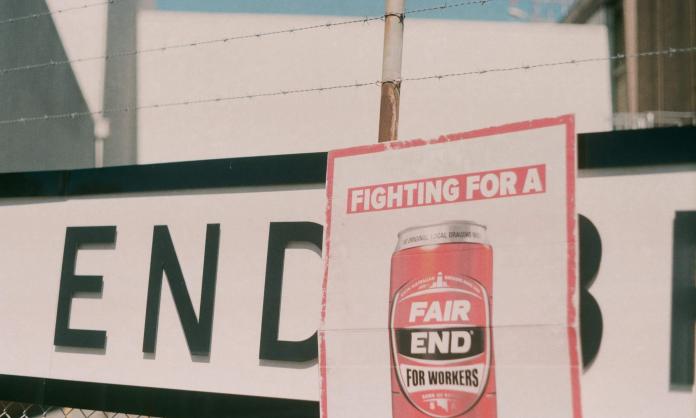West End Brewery workers in Adelaide are on strike to secure a fair redundancy payout when the brewery closes in June.
The four main gates are being picketed by striking workers, union officials, socialists, university students and other supporters. “Nothing in, nothing out” is the motto. In the lead-up to the busiest and most profitable time of the year, the brewers and packers have set up a hard picket to block all trucks.
Since the morning of Wednesday, 2 December, every truck that has tried to unload or pick up supplies has been met by picketers linking arms and chanting, “Union power!” Around midday on Wednesday, managers came out to try to get a truck through. One condescendingly tells the picketers, “I don’t mind a picket, but you just shouldn’t block the gate”. He is duly heckled. Cheers erupt as the truck drives off.
Many drivers leave in solidarity as soon as they see there’s a strike. One with a load of toilet paper agrees not to scab, joking through the window as he leaves, “You guys should use the toilet paper to throw at management”.
At the main gate, passing cars, buses and trucks honk in solidarity. When there are no trucks around, we discuss the strike, past union actions, politics and brewery work.
This brewery has operated for 160 years. The giant facility produces beers and ciders such as West End, Hahn, James Squire, 5 Seeds and Guinness. In October, the company, which is owned by the multinational Kirin, announced the closure of the site and the lay-off of 90 staff. Workers told Red Flag that management decorated the place with “R U OK?” material on the day of the announcement, adding insult to injury.
The strikers are demanding 52 weeks’ redundancy pay. The company has guaranteed only some long-term workers a payout. For casuals and workers who have been around only a few years, the company is offering nothing. Workers say they are fighting for the new people as well as the long-termers.
“They’ve made huge profits year in, year out”, one worker says. Indeed, Kirin made a profit of more than $540 million last year, with the boss taking a salary of $2.8 million. “They’re a company that’s just all about profits over people”, another says. “We’re on strike to try and get a better deal for all of the workers here at West End.”
The bosses have become more anti-union in recent years. A young worker says, “They actually said that as a company they’ve gone from being a people-focused company to a KPI-focused company”. (KPI stands for “key performance indicator”—capitalist jargon for what matters most, i.e. profits.) Management heavyweights have been flown in from Sydney to undermine the strike while getting all-expenses-paid hotel stays. They try to intimidate strikers by filming them and threatening legal action.
The imported scabs are predictably hopeless. Every time the workers hear the machinery malfunctioning, strikers honk an air horn to embarrass them. When we hear bottles smashing, laughter crosses the picket line.
For many, this is not their first strike. Older workers share stories from a time of union strength. Back when the site was a closed shop, if a worker was arrested on the weekend, the company was expected to bail them out. Workers won perks, including a shared company-maintained holiday house.
A story circulates about a manager twenty years ago who tried installing a camera in the workshop, suspecting workers of stealing tools. Hundreds of workers stopped work and chanted for this individual’s head, after which he was promptly dismissed.
But a lot has changed since then. For one, the size of the workforce has dwindled. The bosses have also attempted to drive wedges between workers through subcontracting and other means. Union organisation hasn’t kept up with these trends. In past strikes, all workers operated as one, but this time it’s a struggle to get sparkies, fitters and some truckies on side.
But the strikers are determined to see this through. On 3 December, they voted to continue the action. “It’s unreal”, one says. “The response has been fantastic. People power works.”










